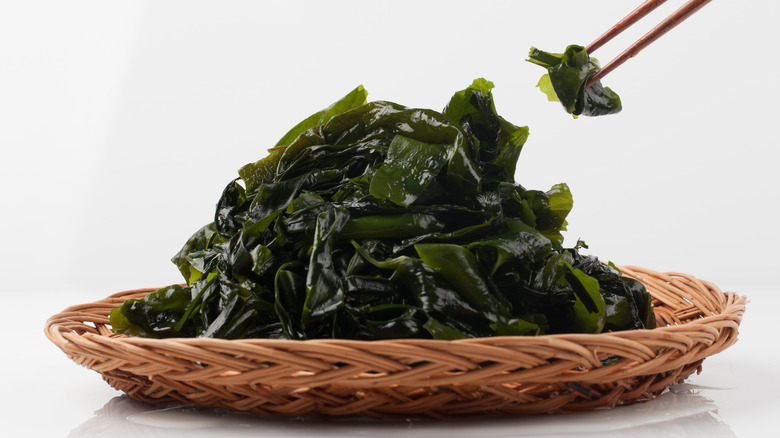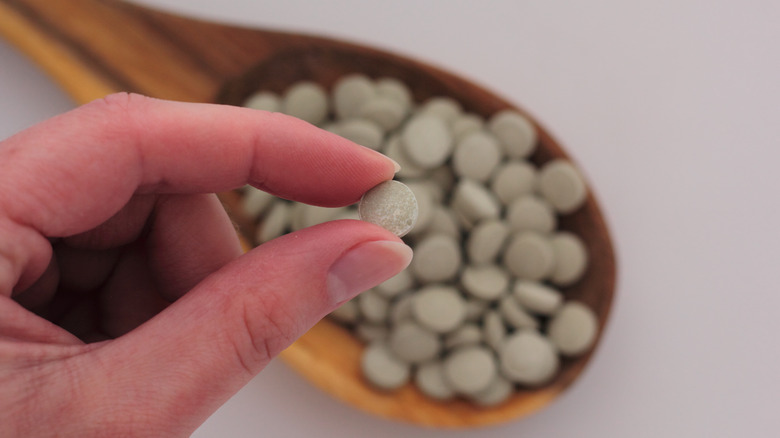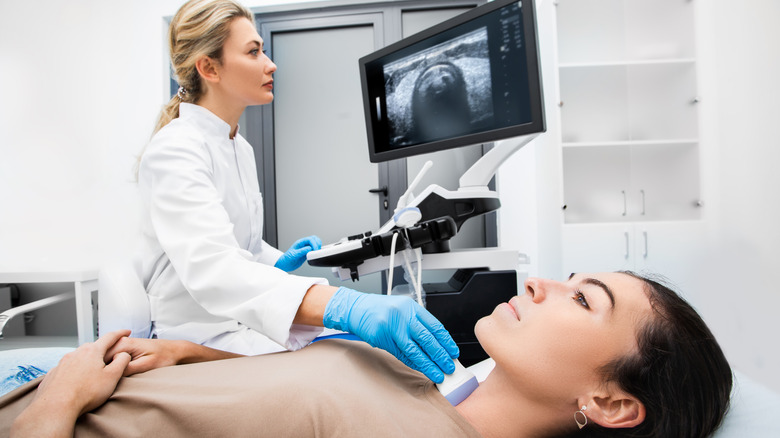Health Benefits Of Iodine And Potential Risks
Did you know that your body doesn't make its own iodine, but needs it in order to function properly? According to WebMD, this essential mineral helps with thyroid function, and while most people get enough iodine through food consumption, some people are lacking in iodine. Without enough iodine, a person risks developing hypothyroidism, which occurs when the thyroid can't function as it should. Symptoms of hypothyroidism include joint pain, fatigue, and even issues with fertility.
Iodine is also referred to as iodide, and it is usually found in the form of iodized salt, reports Healthline. Plant-based foods, such as seaweed, are good sources of iodine. Should you experience hypothyroidism or your iodine level drops, a supplement may be an option for you. However, don't take an iodine supplement without your healthcare provider's recommendation. Here is what you should know about the benefits and potential risks of iodine and iodine supplements.
Benefits of iodine
There are many benefits of iodine, which is why our bodies require it (per WebMD). Iodine is essential for brain development, and it's important that children and women who are pregnant make certain that they consume enough of this essential mineral. The most important responsibility of iodine is ensuring proper thyroid performance by regulating the production of hormones called triiodothyronine (T3) and thyroxine (T4).
Iodine is extremely important during fetal development and early childhood, so it is recommended that expectant women and mothers who are breastfeeding consume enough iodine, according to Healthline. Not only does iodine contribute to proper fetal neurological and cognitive development, but it can also result in a healthy birth weight. Iodine has also been found to help in the treatment of goiters, thyroid cancer, and fibrocystic breast disease.
Interestingly, iodine can be used in case of disaster (via Healthline). In the event of a natural disaster where water may be contaminated, iodine drops can be used to decontaminate drinking water. Should a nuclear event occur, iodine can be used to protect the thyroid from the dangerous effects of radiation. The Centers for Disease Control and Prevention (CDC) advises the consumption of potassium iodide (KI) should an emergency involving radiation occur, although consumption should only occur if advised by a public official or medical provider.
Risks associated with iodine
While an iodine deficiency can lead to hypothyroidism, consuming too much iodine can cause the opposite effect: hyperthyroidism. This is when the thyroid becomes overactive, reports WebMD. One benefit of iodine is the reduction of goiters, but too much iodine can actually result in goiters. Too much iodine can also lead to thyroid inflammation and may be a factor in developing thyroid cancer, even though iodine has also been found to help in the treatment of thyroid cancer. Since iodine can both treat and cause the same conditions, it's always recommended that you consult with your healthcare provider to determine the appropriate amount of iodine for your health.
There's also the risk of iodine toxicity, otherwise known as iodine poisoning (per Mount Sinai). When a person experiences iodine poisoning, they may have symptoms including a metallic taste in the mouth, a burning sensation in the throat, stomach or abdominal pain, soreness in the mouth, and loss of appetite. Symptoms can also include a cough, fever, rash, a feeling of thirst, upset stomach or vomiting, diarrhea that may be bloody, and inability to urinate or lack of urine during visits to the restroom. Severe signs of iodine toxicity include delirium, seizures, stupor, and shock. If you or someone you know may be experiencing iodine poisoning, it is critical that emergency medical care be sought immediately, and a call to poison control should be made. Iodine toxicity is not a condition that should be treated at home.



